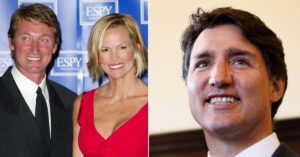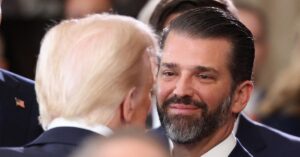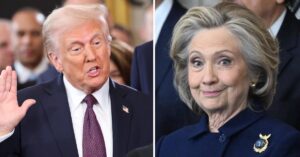The 2025 Canadian Federal Election: A Political Landscape in Flux
In 2025, Canada is gearing up for a pivotal federal election, as mandated by the constitution to take place before October 20. The political arena is abuzz with activity as the Liberal Party, led by Justin Trudeau, and the Conservative Party, led by Pierre Poilievre, prepare to battle it out for the hearts and minds of Canadian voters.
Recent developments have added an extra layer of complexity to the political landscape. Finance Minister Chrystia Freeland’s resignation from the Canadian prime minister’s cabinet has sent shockwaves through the country. This move prompted opposition leader Jagmeet Singh to call for Justin Trudeau’s resignation, setting the stage for a potentially tumultuous election cycle.
However, the drama did not stop at the Canadian border. The U.S. president-elect also weighed in on the situation, with Donald Trump taking to his Truth Social platform to comment on Chrystia Freeland’s departure. In a characteristically brash statement, Trump criticized Freeland’s behavior and suggested that Canada could potentially become the 51st state of the United States.
These developments have sparked intense debate and speculation about the future direction of Canadian politics. As the country braces for a period of uncertainty and upheaval, all eyes are on the upcoming election and the potential ramifications for Canada’s political landscape.
Justin Trudeau and the Liberal Party: A Tumultuous Time
Justin Trudeau, the current leader of the Liberal Party, finds himself at the center of a political storm as Canada hurtles towards the 2025 federal election. Trudeau, who has been in power since 2015, is facing mounting pressure from both within his own party and from opposition leaders.
Trudeau’s leadership has been called into question following the resignation of Finance Minister Chrystia Freeland. The fallout from Freeland’s departure has cast a shadow over Trudeau’s administration, with critics accusing him of failing to effectively manage his cabinet and maintain party cohesion.
Despite these challenges, Trudeau remains a formidable force in Canadian politics. His tenure as prime minister has been marked by a focus on progressive policies, including climate action, social justice, and reconciliation with Indigenous communities. However, his leadership style and handling of recent crises have raised concerns among some voters and political observers.
As the election looms on the horizon, Trudeau faces a critical test of his leadership and the future direction of the Liberal Party. With the specter of resignation looming over him, Trudeau must navigate a treacherous political landscape to secure his party’s position and rally support from Canadian voters.
Pierre Poilievre and the Conservative Party: A Rising Challenger
On the other side of the political divide, Pierre Poilievre leads the Conservative Party into the 2025 federal election as a formidable challenger to Justin Trudeau’s Liberal Party. Poilievre, known for his conservative views and outspoken demeanor, has positioned himself as a strong alternative to Trudeau’s leadership.
Poilievre’s leadership of the Conservative Party has been marked by a focus on economic issues, including fiscal responsibility, tax cuts, and deregulation. His platform appeals to conservative voters who prioritize economic growth and stability, offering a stark contrast to Trudeau’s progressive agenda.
As the election draws near, Poilievre is positioning himself as a champion of conservative values and a voice for change in Canadian politics. With a clear vision for the future of the country, Poilievre is seeking to capitalize on public dissatisfaction with the current government and present a compelling alternative to Trudeau’s leadership.
With the Conservative Party gaining momentum and Poilievre’s star on the rise, the upcoming election promises to be a closely contested battle between two formidable opponents vying for the future of Canada.

Chrystia Freeland’s Resignation: A Political Bombshell
The resignation of Finance Minister Chrystia Freeland sent shockwaves through the Canadian political landscape, triggering a wave of speculation and debate about the reasons behind her departure. Freeland, a key figure in Justin Trudeau’s cabinet, played a pivotal role in shaping the government’s economic policies and response to the COVID-19 pandemic.
Freeland’s resignation was met with mixed reactions, with some praising her for taking a principled stand and others criticizing her for creating turmoil within the government. Her departure has exposed rifts within the Liberal Party and raised questions about Trudeau’s ability to manage his cabinet effectively.
As the dust settles from Freeland’s resignation, the implications for the upcoming election remain uncertain. Her absence leaves a void in Trudeau’s administration and raises doubts about the government’s ability to navigate the challenges ahead.
Ultimately, Freeland’s resignation serves as a stark reminder of the volatility of Canadian politics and the high stakes involved in the upcoming election. As the country grapples with uncertainty and division, the fallout from Freeland’s departure is likely to reverberate through the political landscape for months to come.
Donald Trump’s Intervention: A Controversial Commentary
Former U.S. President Donald Trump’s intervention in Canadian politics added a new layer of controversy to an already turbulent situation. Trump’s comments on Chrystia Freeland’s resignation and the possibility of Canada becoming the 51st state of the United States sparked outrage and debate on both sides of the border.
Trump’s criticism of Freeland and his suggestion that Canada could benefit from joining the United States drew swift condemnation from Canadian politicians and citizens. Many viewed Trump’s remarks as an unwarranted intrusion into Canada’s internal affairs and a display of disrespect towards a sovereign nation.
However, Trump’s comments also highlighted the complex relationship between the two countries and the enduring debate over Canada’s place in North America. The idea of Canada becoming a U.S. state is not a new concept, with proponents arguing that closer ties with the United States could bring economic benefits and security advantages.
As Canada navigates a period of political upheaval and uncertainty, Trump’s intervention serves as a reminder of the interconnected nature of international politics and the potential impact of external influences on domestic affairs.
Looking Ahead: The Future of Canadian Politics
As Canada prepares for the 2025 federal election, the political landscape is more uncertain and volatile than ever before. With key players jockeying for position and new challenges emerging on the horizon, the stakes are high for the future of the country.
Justin Trudeau and Pierre Poilievre are set to go head-to-head in a battle for the hearts and minds of Canadian voters, with the outcome of the election likely to shape the trajectory of Canadian politics for years to come. The resignation of Chrystia Freeland and the controversy surrounding Donald Trump’s intervention have added a new layer of complexity to an already intense election cycle.
As Canadians prepare to cast their ballots and determine the future direction of their country, one thing is clear: the 2025 federal election will be a pivotal moment in Canadian history, with far-reaching implications for the political landscape and the future of the nation.
Explore More in Our News Feed






